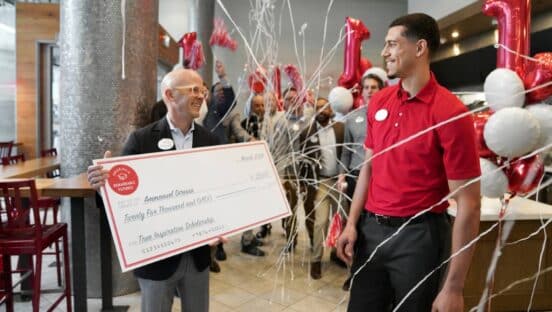Summer can be a good thing for quick serves. Tourists come to town, high school students can work more hours, and profits often go up. But handling an increased flow of customers, replacing college employees who leave for the summer, and training the new staff can be difficult. Quick serves in tourist areas have had to find ways to adjust.
Ruby’s Restaurant Group operates Ruby’s Shake Shack, a popular quick serve in Newport Beach, as well as several grab-and-go counters in malls and airports. Both its casual diners and the Shack hire extra employees to help with the summer rush. Scott McIntosh, vice president of operations, says it’s important to make sure those new employees are sufficiently invested in the company.
“The term temporary workers implies that they’re there for a little while and they don’t really care,” McIntosh says. “We don’t really call them temporary workers as much as seasonal.”
HDOS Enterprises, the parent company for California–based Hot Dog on a Stick, has a similar mindset. Managers often keep track of former seasonal workers, and the average Hot Dog on a Stick worker stays for three years.
“It’s not necessarily doing a whole lot of new hiring, it’s doing a lot of rehiring,” says Midori Cronky, interim manager of human resources. “A lot of them will come back and visit home, and they will work at their original location during the holidays or summer.”
But when new staff members have to be hired, preparation is important. Nick Patronas owns three Burger King restaurants in Duluth, Minnesota, and one in Superior, Wisconsin. These beach communities bring huge tourist traffic. At one point, Patronas owned a restaurant which went from 20 staff members in the off season to 70 in the summer. To hire that many people, he would start planning well in advance.
“The smart kids are looking two months before school lets out,” Patronas says. “Those are the ones who are looking ahead, who are energetic—you know they’re probably going to be good workers, too.”
There are a few approaches to training the new workers. In summers and especially during the winter holidays, Hot Dog on a Stick brings in a lot of extra help. Since they are only there for a short while, they only have to learn the basics.
“A lot of the employees are hired for just Christmas help,” Cronky says. “We have the more experienced Hotdoggers working the cooker, working the register.”
Another alternative is to train everyone at once. Patronas worked together with a certified trainer to develop a mass training session in a local hotel. After discussing the basics, new staff continued their training on-the-job.
“When you’re hiring that many people at one time,” Patronas says, “that’s the only way to do that.”
McIntosh thinks of the issue in financial terms. Although training workers before they’re needed costs money, he says it’s worth it in terms of their productivity once summer starts.
“You have to hire before the season hits,” McIntosh says. “Places I’ve seen that don’t do it right, they wait until the last minute, and they hire people and don’t train them properly.”
The end of a busy period can be as challenging as the beginning. Cronky says Hot Dog on a Stick sets clear expectations for its holiday workers so they won’t be surprised when they’re no longer needed.
“If they’re hired for the holiday season, they know that right away,” Cronky says. “We have them sign a little thing—you are being hired as holiday help, your hours are not guaranteed, etc.”
Patronas takes a different approach. In order to recoup his training investment, he tries to keep as many of his staff as possible. His managers work the best of the summer employees into the normal rotation, even if they can’t work many hours.
“Some of them want just summer jobs,” Patronas says, “But it’s not a benefit to us when we’re hiring people just for the summer and then they leave. I’d rather have more part-time people working … that way you get the better of the kids.”
Juggling staff members, dealing with the ebb and flow of tourists, and training new workers can make preparing for summer tricky. But with the right planning, it can be a smooth process—even perhaps enjoyable.
“We’re used to it,” McIntosh says. “We kind of look forward to it.”













